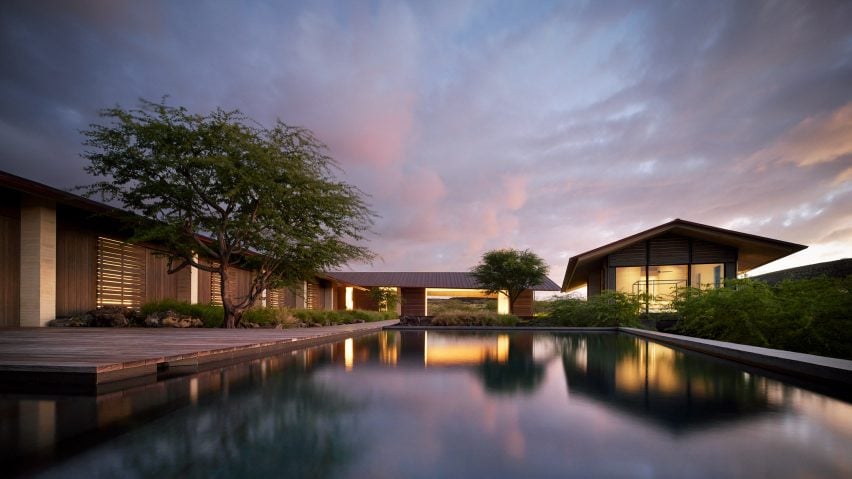Shallow-gabled roofs allow the pavilions of this holiday home by Walker Warner Architects to embrace the gentle volcanic slope of Hawaii's Big Island.
The vacation property is named Hale Mau'u – hale means house in Hawaiian, and mau'u is a type of native grass.
It sits on the western shore of the archipelago's largest island, which has a very different landscape to the tropical rainforests typically associated with Hawaii.
"For anyone who has never visited Hawaii's Big Island, it can be surprising to discover that a vast arid plain occupies a significant portion of its western side, sloping gently down from the Hualalai Mountain to the coastline," said Walker Warner Architects.
The San Francisco-based firm has completed several homes across the Hawaiian archipelago, including a beach house on Kauai and a holiday home in the Big Island's Kona resort.
For this project, the team took cues from the setting to design "a house like no other" – based on the clients' request to eschew resort community architecture.
"This site is unique in its ability to capture the ocean view and mountain view simultaneously. Not all parcels get that," said the firm's co-founder, Greg Warner.
"The arrangement of the 4,817-square-foot (447-square-metre) compound had to do three things: catch the mountain view, catch the ocean view, and then block the view of the neighbouring houses."
On the 2.9-acre site, the home is spread across four volumes. These have various sizes and orientations but are united in their architectural style.
The most distinct feature is the shallow-pitched, copper standing seam roofs, which extend well beyond each building's walls to shelter ipe-wood perimeter walkways from the sun.
The roofing seams are randomly spaced to evoke the texture of a coconut palm trunk.
A long driveway culminates in front of the first and smallest pavilion, which connects directly to the second and largest containing the shared living room, kitchen, and family room.
Through the centre of the compound, a raised walkway forms an axis from the mountain to the ocean.
It runs from the entrance through a courtyard created by three of the volumes, ending at the outdoor swimming pool.
A series of bedrooms for family and guests are housed within the long volume connected to the main "hale", while the grand bedroom suite occupies its own block opposite.
The interiors feature polished concrete floors, exposed steel columns and bald cypress ceilings.
The guest-bedroom wing and living area are equipped with barn-style doors, which slide open so that indoor activities can easily spill into the outdoor spaces.
Section of the living volume's longer sides both retract, creating an unobstructed view from mountain to sea.
Even when closed, horizontal gaps in the grey-stained cypress facades allow for natural ventilation, while exaggerating the lines of the architecture. At night, light from inside glows softly through the slatted walls.
Photography is by Matthew Millman.
Project credits:
Architecture: Walker Warner Architects
Walker Warner Architects project team: Greg Warner, principal; Thomas Clapper, senior project manager; Dan Baciuska, Matthew Yungert, Boyce Postma and Darcy Arioli, architectural staff
Landscape: David Y Tamura Associates
Builder: Metzler Contracting Co
Lighting Design: Anna Kondolf Lighting Design
Structural Engineering: GFDS Engineers
Mechanical Engineering: Hakalau Engineering
Electrical Engineering: Morikawa & Associates
Civil Engineering: Aina Engineers
Geotechnical Engineering: Geolabs

